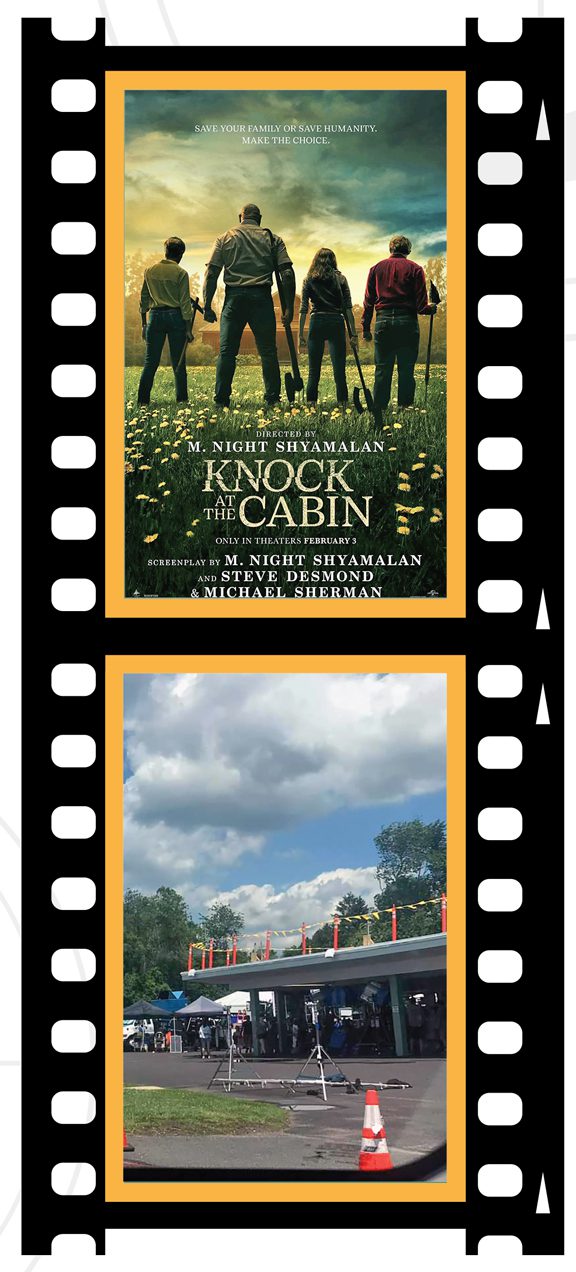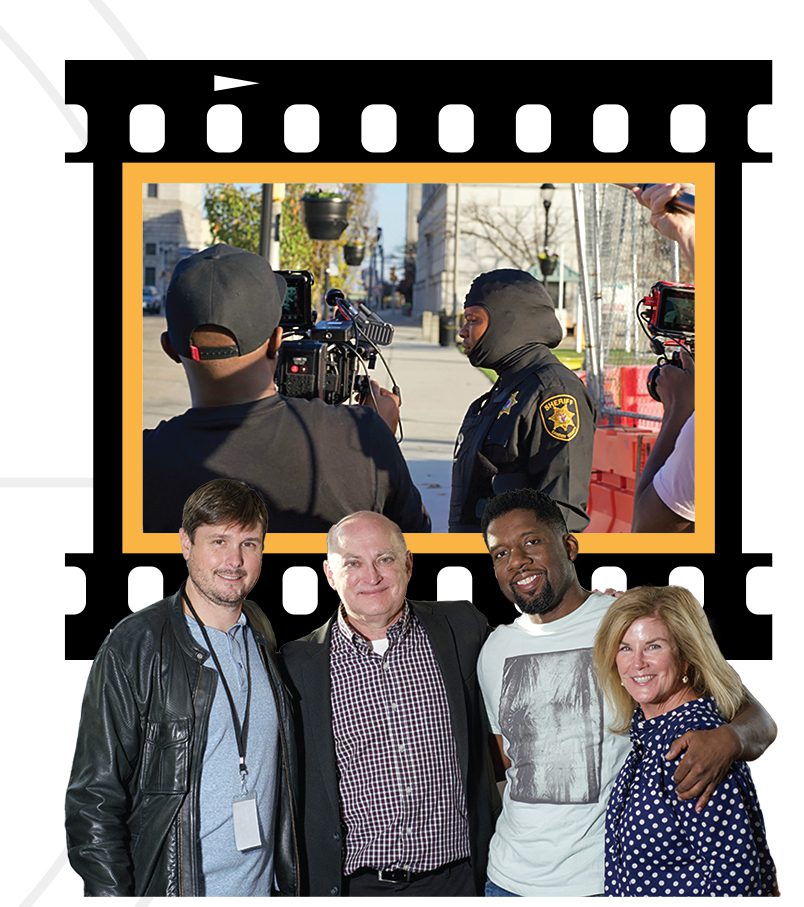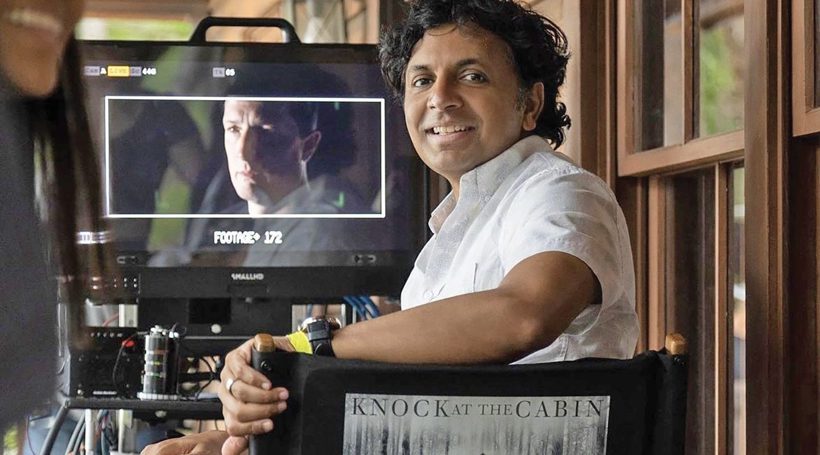Moviemakers like M. Night Shyamalan have discovered something we’ve always known: South Jersey is packed with beautiful and interesting locations. Now, only 2 years after the opening of the South Jersey Film Office Cooperative, production companies are using those picture-perfect settings for their movies and TV shows. So start looking very closely next time you’re watching a show – you never know what favorite South Jersey spot just might make an appearance.
To set the scene for his 15th movie, M. Night Shyamalan envisioned old-growth trees, dense vegetation, whistling wind and the rustling and clattering of birds, deer and other woodland animals. The location he had in mind needed to evoke the beauty and majesty of a fairy-tale forest – a setting where magical, even sinister, things would not seem so far out of the norm.

“Knock at the Cabin” filmed in Tabernacle, Evergreen Dairy Bar
Although he may not have known it at the time, Shyamalan was describing the Pine Barrens. When his crew reached out to the New Jersey Motion Picture and TV Commission for help finding the perfect place to film “Knock at the Cabin,” scouts led him straight to rural South Jersey. And that’s how the psychological thriller – about a family whose idyllic vacation away from it all turns into an apocalyptic nightmare – was primarily shot on the grounds of a cranberry farm in Tabernacle in April 2022 .
Along with headlining actors Jonathan Groff (“Hamilton” and “The Matrix Resurrections”), Ben Aldridge (“Spoiler Alert”), former wrestler-turned-actor Dave Bautista and Rupert Grint of Harry Potter fame, the film released by Universal Pictures earlier this year prominently features the natural charm of the Pinelands. Shyamalan was thrilled with both the location and the ease of the experience in carrying out his dark vision in South Jersey, says Steven Gorelick, executive director of the Commission.
“It was exciting for us,” says Gorelick. “Night films a lot in the region and did some scenes for ‘The Village’ in South Jersey years ago. But this was the first major studio movie he’s done here. And it’s unusual that he built the cabin. It wasn’t just a temporary construction but a full-blown cabin.”
The cameras also rolled in nearby Southampton at the Evergreen Dairy Bar. The Vincentown institution was transformed into “Angie’s Roadside Diner” for a scene in which owner Deborah Ware’s adult children served as extras along with some of the Evergreen’s real employees, basically playing themselves.
Besides the excitement of having a well-known director and celebrities spotted at local hangouts, the movie brought a flurry of other money-making activity to Burlington County – from off-duty police officers working security, catering calls to local restaurants, the hiring of locals both behind the scenes and on camera to the purchase of production supplies.
Gorelick says “Knock at the Cabin” brought in approximately $5 million to the state during its short filming stint. It was one of 94 feature films, 21 limited series and mini series, and over 100 TV series and specials filmed in the Garden State last year. The industry created some 8,500 jobs and brought in revenue that will exceed $670 million, adds Gorelick, noting that the final count is not yet in.
“It was the best year ever for filming in New Jersey,” he says, “and it’s money spent in the local economy.”
The tally shattered the Commission’s previous highmark – $501 million from 68 feature films and 132 television series in 2021. As Gorelick tells it, New Jersey – which is where the film industry began some 130 years ago in Thomas Edison’s
invention labs – has always been an attractive place to make movies. There’s a lot of reasons for that, including the state’s large talent pool, the enthusiasm of government officials to help productions run smoothly and the sheer number of varied, unique and versatile locations from the southern tip of Cape May to mountainous Sussex County – all within a short distance of each other.
“The final piece of the puzzle was the tax incentives created in 2018, which opened the flood gates to production that filmmakers are taking advantage of,” says Gorelick. “Now they save money by filming here. It’s an irresistible combination of things that attract film and TV production.”
By incentives, Gorelick is referring to New Jersey’s aggressive program providing tax credits worth 35 percent of the costs of cast and crew salaries for filming anywhere statewide. Moreover, movies done within what is known as the Manhattan studio zone receive 30 percent credit for other production-related costs, including rentals and purchases. In South Jersey and other areas outside of the zone, the credit is boosted to 35 percent of qualified production costs.
On top of that, productions that meet the state’s diversity requirements receive an additional 2 or 4 percent bonus. This is intended to increase diversity both on screen – creating an incentive to not only employ people of color as actors but also to produce their scripts – and off screen in the hiring of diverse production staff, Gorelick says.
The reason tax credits are higher for filming outside of New York environs is to even out the built-in advantage towns closer to New York City have, he says. Per union rules, production companies don’t have to pay their crews’ travel costs within a 30-mile radius of the New York City studios.
The 35 percent credit is paying off, Gorelick says, noting it’s a big enough enticement to get filmmakers interested in South Jersey. Then the region sells itself.
“The result is that more and more filmmakers are discovering South Jersey,” Gorelick says. “I get rave reviews about the many wonderful locations and how cooperative towns are. And there are a trove of locations yet to be discovered.”
The tax credits brought a Los Angeles-based production company to Camden late last year for the filming of “Call Her King,” an action/adventure film about a Black female judge whose courtroom is taken hostage by the head of a surveillance company trying to break his brother out of the prison system. Kerry Richards, coordinator of the South Jersey Film Cooperative, says working with independent filmmaker Wes Miller and producer Andrew van den Houten of BlackLight Entertainment was a literal trial by fire.
“They did a car chase scene that went right under the Ben Franklin Bridge, and there were lots of theatrical fires,” says Richards, noting that most of the stunts and pyrotechnics took place late at night and only after informing businesses and residents within a 10-block radius that the unexpected sounds and lights were the result of filming.
When the proposal was first discussed, Kerry says, there were lots of concerns that pulling off the stunts and explosives would be impossible. However, she says, city and county leaders took the stance that they wouldn’t reject any proposal before fully exploring if it could be done safely and successfully.
“It was quite a success story,” she adds. “We were able to look at every situation and figure out how to make it work. Also it was amazing in terms of our leadership being supportive, and due to the collaboration among agencies.”
Producer Andrew van den Houten says he had never been to Camden or Gloucester County before he flew out from LA to scout locations. Everything about the experience exceeded his expectations.
“We wanted to be in a community that was diverse, where dollars would support the communities we’re trying to tell stories about,” he says. “South Jersey, and particularly Camden, allowed us a great opportunity to really do that.”
He says their stay at the Hilton Garden Inn on the waterfront was excellent, as were their meals from Donkey’s Place, Corinne’s Place and other notable restaurants.
“There were a lot of really nice people,” he says. “Unlike LA, people are generally not film shy, because they haven’t been burned or oversaturated with a lot of shooting, right? So they generally are way more open and willing to help.”

“Call Her King” Producer Andrew van den Houten, Steven Gorelick of the New Jersey Motion Picture and TV Commission, Independent Filmmaker Wes Miller and Kerry Richards of the South Jersey Film Cooperative
“Call Her King” had a $3.5 million budget, of which approximately $2.1 million was spent in Camden, says Richards. Some scenes that could not be accomplished in Camden were shot at the Gloucester County Courthouse. The movie will stream on BET+ Original starting July 6, and the film’s premier is scheduled for June 28 at Rutgers University-Camden.
It was one of 4 independent movies and multiple commercials Richards helped shephard through the South Jersey Film Office Cooperative, which was started 2 years ago to facilitate filming in South Jersey. Since then, she’s been busy reaching out to businesses and government officials across the region to identify film-worthy locations, establish contacts willing to help with production crews and advise them how to get things done. The Cooperative’s website posts dozens of photos of buildings, historic towns and parks, all with write-ups about what makes them good spots for movie crews. There are also listings of local vendors and talent in the area.
Among last year’s productions, Wade Salvage – a one-of-a-kind junkyard in Atco – was filmed for some scenes of the post-apocalyptic drama TV series “Fallout,” which is coming to Amazon Prime later this year. Richards says the yard is in high demand for zombie series, which are very popular these days. The 3 days of filming generated $2 million in revenue to the region.
With more and more filmmakers getting to know South Jersey, Richards says next-level success will come by wooing production companies to build studios in the region, similar to the one Netflix is building in a long-shuttered Army facility further north in Fort Monmouth. It’s definitely a possibility, she says, noting that several well-known producers have made trips to South Jersey to scope out locations.
Production studios are indeed game changers, says Gorelick. “Some of the TV series filming in North Jersey spend $80 to $100 million on just one project,” he says. “That’s the kind of money we’re talking about. We’re not an arts agency, even if what we do contributes to culture in the state. We’re all about job creation, improving the image of New Jersey and showing New Jersey as a desirable place to live, work and play.”














